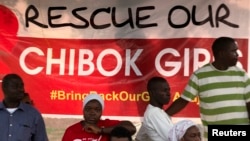An official in Chibok -- the Nigerian village where more than 200 schoolgirls were kidnapped -- said the government should negotiate with Islamist militants to win the girls' release.
On Sunday, President Goodluck Jonathan ruled out negotiations to free the girls, saying the captives should be released "unconditionally."
However, Zanna Madu, the district head of Chibok town, said the government should listen to Boko Haram's demand for imprisoned militants to be freed in exchange for the girls' release.
"They have given their conditions. And if our interests are, or everybody's interests are, to get these girls alive and healthy, obviously I see no reason why they should not go into negotiations," said Madu.
In an interview with VOA's Hausa Service on Tuesday, Madu welcomed comments from Nigeria's defense chief Air Marshal Alex Badeh, who said the military knows the girls' location, but does not want to risk their lives with a rescue operation.
"I've been saying so and I'll say it again and again -- we should not use any force at all," said Madu.
The girls were kidnapped in mid-April while taking exams at a secondary school in Chibok, a remote village in Borno state.
Jonathan and his government are facing sharp criticism both domestically and internationally for their failure to rescue the girls.
A Chibok community elder, Malam Shettima Dunoma, told VOA his group is organizing a series of rallies to pressure Jonathan's government to do more to try to free the girls.
He also said a presidential fact-finding committee on the kidnapped girls had failed to meet with his group or visit Chibok, despite promises to do so.
Several countries, including the United States, are providing Nigeria with help to look for the girls.
On Sunday, President Goodluck Jonathan ruled out negotiations to free the girls, saying the captives should be released "unconditionally."
However, Zanna Madu, the district head of Chibok town, said the government should listen to Boko Haram's demand for imprisoned militants to be freed in exchange for the girls' release.
"They have given their conditions. And if our interests are, or everybody's interests are, to get these girls alive and healthy, obviously I see no reason why they should not go into negotiations," said Madu.
In an interview with VOA's Hausa Service on Tuesday, Madu welcomed comments from Nigeria's defense chief Air Marshal Alex Badeh, who said the military knows the girls' location, but does not want to risk their lives with a rescue operation.
"I've been saying so and I'll say it again and again -- we should not use any force at all," said Madu.
The girls were kidnapped in mid-April while taking exams at a secondary school in Chibok, a remote village in Borno state.
Jonathan and his government are facing sharp criticism both domestically and internationally for their failure to rescue the girls.
A Chibok community elder, Malam Shettima Dunoma, told VOA his group is organizing a series of rallies to pressure Jonathan's government to do more to try to free the girls.
He also said a presidential fact-finding committee on the kidnapped girls had failed to meet with his group or visit Chibok, despite promises to do so.
Several countries, including the United States, are providing Nigeria with help to look for the girls.





